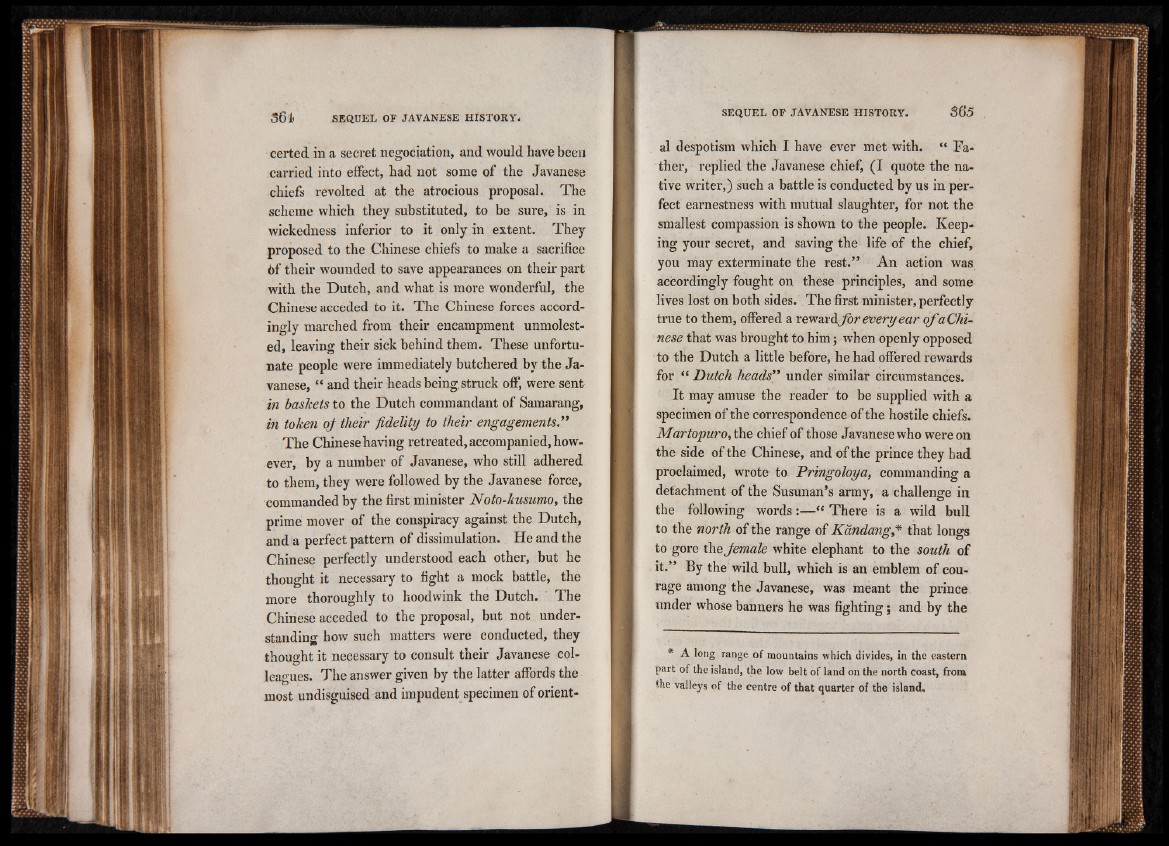
certed in a secret négociation, and would have been
carried into effect, had not some of the Javanese
chiefs revolted at the atrocious proposal. The
scheme which they substituted, to be sure, is in
wickedness inferior to it only in extent. They
proposed to the Chinese chiefs to make a sacrifice
6f their wounded to save appearances on their part
with the Dutch, and what is more wonderful, the
Chinese acceded to it. The Chinese forces accordingly
marched from their encampment unmolested,
leaving their sick behind them. These unfortunate
people were immediately butchered by the Javanese,
“ and their heads being, struck off, were sent
in baskets to the Dutch commandant of Samarang,
in token oj their fidelity to their engagements.”
The Chinese having retreated, accompanied, however,
by a number of Javanese, who still adhered
to them, they were followed by the Javanese force,
commanded by the first minister Noto-kusumo, the
prime mover of the conspiracy against the Dutch,
and la perfect pattern of dissimulation. He and the
Chinese perfectly understood each other, but he
thought it necessary to fight a mock battle, the
more thoroughly to hoodwink the Dutch. The
Chinese acceded to the proposal, but not understanding
how such matters were conducted, they
thought it necessary to consult their Javanese colleagues.
The answer given by the latter affords the
most undisguised and impudent specimen of oriental
despotism which I have ever met with. “ Father,
replied the Javanese chief, (I quote the native
writer,) such a battle is conducted by us in perfect
earnestness with mutual slaughter, for not the
smallest compassion is shown to the people. Keeping
your secret, and saving the life of the chief,
you may exterminate the rest.” An action was
accordingly fought on these principles, and some
lives lost on both sides. The first minister, perfectly
true to them, offered a rewardfor every ear ofa Chinese
that was brought to him j when openly opposed
to the Dutch a little before, he had offered rewards
for “ Dutch heads” under similar circumstances.
It may amuse the reader to be supplied with a
specimen of the correspondence of the hostile chiefs.
Martopuro, the chief of those Javanese who were on
the side of the Chinese, and of the prince they had
proclaimed, wrote to Pringoloya, commanding a
detachment of the Susunan’s army, a challenge in
the following words:—“ There is a wild bull
to the north of the range of Kdndang,* that longs
to gore thojemale white elephant to the south of
it.” By the wild bull, which is an emblem of courage
among the Javanese, was meant the prince
under whose banners he was fighting; and by the
* A long range of mountains which divides, in the eastern
part of the island, the low belt of land on the north coast, from
the valleys of the centre of that quarter of the island.